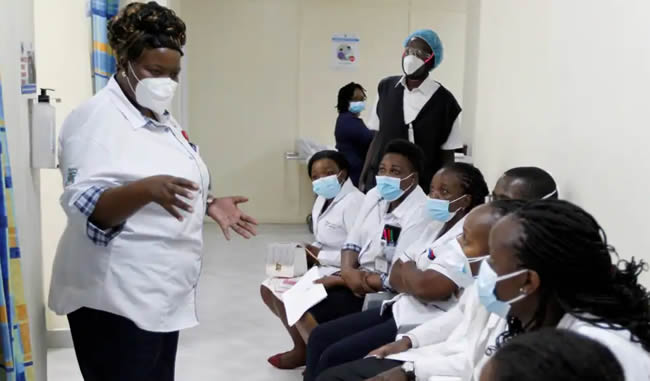
In the December holiday season of giving, undocumented immigrants in South Africa are getting the gift of COVID-19 vaccinations.
The government, with the help of nonprofit groups, is offering the vaccine to the country’s estimated 2 million undocumented in a bid to curb the spread of the coronavirus.
Until now, many could not get vaccinated because they did not have the required identification. But that changed after a lobbying effort by nonprofit groups.
The nonprofit NOAH CAN recently arranged for vaccinations to be given at a Johannesburg shelter.
Some people in South Africa are “not necessarily registered,” said Julie Machin, a volunteer with the group. “They might be on asylum papers or something. Obviously, it’s difficult to access vaccinations if you are not South African, and there’s quite a lot of barriers to that. And so, we just wanted to make an opportunity so it would be easy for people to get access to a vaccination.”
Many in line at the shelter who were receiving their first jabs were not South African, including Rapheal Dube, 42, who said he was appy to get his shot.
“You know what? We, at the end of the time, we need to be vaccinated,” Dube said.
People living in South Africa must be registered on the Electronic Vaccination Data System to receive a vaccine. The system requires each person to have an identification number so the government can track who was vaccinated, record which vaccine each person received and follow up with an individual if needed.
This new program, offered only at selected sites, allows an undocumented person to be given a unique identifier to be vaccinated and tracked for health purposes only.
Building trust
According to aid group Doctors Without Borders, the response has been positive. Dr. Vinayak Bhardwaj, who works with the nonprofit, said authorities need to build more trust before the program can be rolled out on a mass scale.
“I think a lot of migrants are afraid of being exposed,” Bhardwaj said. “They’re afraid that if they go out to go and get vaccinated, then they might become subject to law enforcement. They also worried about their information being shared with the Department of Home Affairs. So as far as possible, we are hoping that the Department of Health can institute a process that, of course, achieves the legitimate public health goals that they are trying to pursue, but also that protects the anonymity of migrants.”
U.N. agencies say an estimated 1 billion people around the world are on the move because of conflict, violence or climate change. Officials say governments and aid groups must work together to ensure everyone has access to the vaccine to help bring the pandemic to a close.
Source: voanews.com























